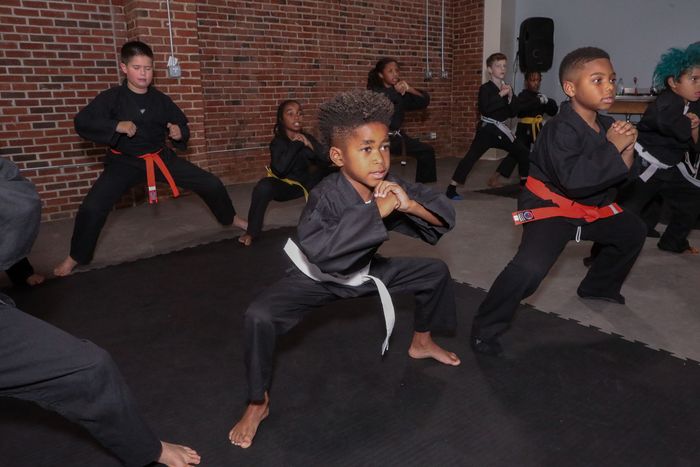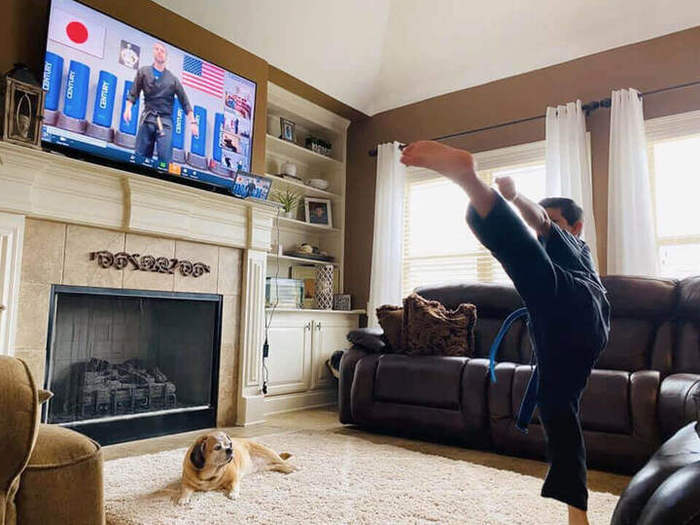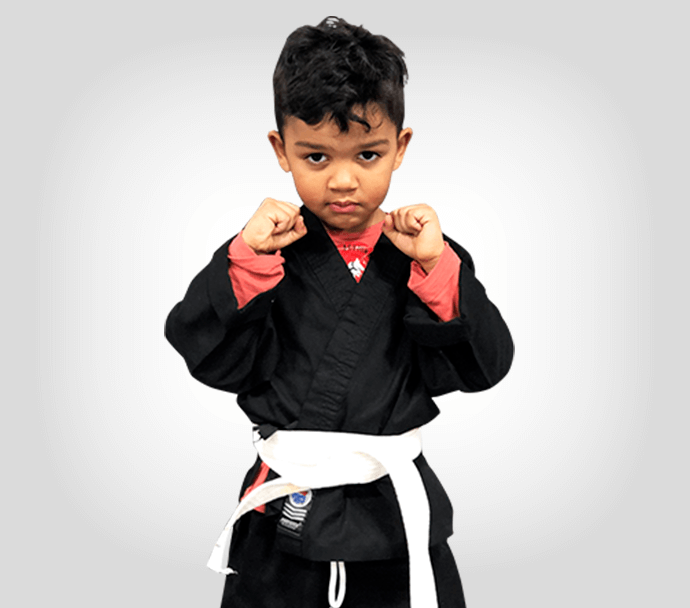Everyone is here is for Kellan.
He’s a tiny Asah Shark, thin, a few strands of blonde hair left on his head. No eyebrows.
He’s wearing an oversized uniform, a blue gi top embroidered with his name, and white pants with the cuffs rolled up. He has a blanket wrapped around his shoulders.
This day is for Kellan.
The date: April 17, 2021
The place: A parking lot in North Wales, Action Karate, a place he has been many times as a martial artist in training
The occasion: A wish
The time: There’s not much left
The request: Kellan wants to be on the demo team one day. His diagnosis is dire. Calling all Action Karate demo teams to show up and perform.
The response: I’m in. We’ll be there. We’re in. I’ll do it.
The overwhelming response: Every Action Karate demo team from the inexperienced younger junior demo teams to the nationally ranked Team Action to the revered head instructors all agreed to show up and perform for Kellan. They came from around the state and the “retired” ones dusted off their best tricks.
In all, 15 teams and over 150 people. Consider the context of this. There were serious restrictions: masked the entire time, socially distant. No one could get within 15 feet of Kellan. Performers had to wait in their cars, bring all their gear and music, coordinate their moves and leave as soon as they’re done to avoid any semblance of a crowd.
It was like a Make-A-Wish event where a kid throws a first-pitch or gets the royal treatment at Disney. Except this one was filled with tornado kicks and spinning staffs. There has never been an event like this in 26 years of Action Karate, and it came at a time in the pandemic when performing publicly felt like an experience of the past. None of the demo teams had seen another demo team in over a year.
The call for Kellan’s wish hit a nerve. The instructors and demo team members hadn’t been asked to do anything like this before.
At this stage of life, Kellan should be playing, learning, growing, and instead, he is at the stage of reflecting and finding wisdom in each moment. This stage should be saved for the elderly.
The team at North Wales prepared for this special event. They borrowed nearby parking lots and put up a rainbow of balloons for Kellan’s front row folding chair with his family. Kellan’s instructors at Action Karate introduced him to the crowd and he beamed. He held his mom’s hand or his dad’s hand and leaned forward, gripped by every outside crescent kick. After each team performed, North Wales Head instructor Mr. Shawn Nichols billowed, “What do we think of that?” The spread-out spectators roared and Kellan gave his vote: two thumbs up.
“Let’s hear it for Team FEASTERVILLE! Kellan how did they do?”
A huge smile. Two thumbs up. And so it went, team after team, moment after moment.
Instructor McKenzie Fagans brought a shirt from Action Newtown with signatures from the whole demo team. Her team cried on and off all day. This one hurt. Newtown has an 8-year-old Kellan who is now cancer-free. “This hits close to home. It is really emotional for us,” she said.
Instructor Jess Bennett found out in advance what was Kellan’s favorite weapon. On behalf of Action Quakertown, Kellan got performance nunchucks. Kellan asked for them throughout the event and cradled them along with his stuffed animal.
“It puts everything in perspective,” said Mt. Airy Demo Coach Kelly Champagne. “You never know what people are going through.”
We’re all going through pandemic pains. Here’s Kellan’s, from kellanford.com: “August 31, 2020 Kellan Ford was diagnosed with a brain tumor, metastatic Medulloblastoma in the brain and spine. 48 hours later he had surgery, then 30 days of full brain and spine proton radiation. Kellan started his 7 month chemotherapy journey in December 2020. He stopped responding to treatment in March 2021 after new growths in his brain and cancer spread to his bone marrow throughout his body.
“Kellan continues to fight, laugh, joke, and is living his best life. The next few months will be filled with a lifetime of memories,” is the euphemism his family uses at the end of that paragraph, and we will leave it at that.
Master Anthony Atkins had never met Kellan before. Atkins is the admired Huntington Valley Demo Team coach and a world champion seven times over. He handed over his 2nd-degree black belt to Kellan. It’s a significant gesture – belts are special meaningful keepsakes. It would be like giving away a Super Bowl ring.
“I want him to be able to hold a Black Belt, let him have that belt because that was one of his goals. It’s out of reach for them,” Atkins said. “They were surprised I gave him that. To me, that’s what you do for your karate family. This is my karate cousin.”
Being part of Action Karate felt extra important. Kellan inspired martial artists to use their time for something that brought everyone together.
That night Kellan dozed off with a BIG SMILE, and said, “Mom I’m gonna dream about Demo Team tonight!”
Kellan got a dream day and we all got a big memory. In all Action Karate classes for years to come, we will share this lesson about the value of time:
This Lesson is about something extremely valuable. It’s not money or talent or trophies. It’s something we all have the same exact amount of today – TIME. We all have 24 hours today.
There’s an ASAH shark named Kellan and he had a really bad illness – so bad that doctors told his family he wouldn’t get as much time to live as most other people.
Kellan’s parents and older brother decided they would laugh, joke, love, and live his best life. That Kellan would get a lifetime of memories in just a few months.
One of those memories was a special day at Action Karate when every demo team performed for Kellan and he got to be the captain for the day. His instructor Mr. Nichols said to the 15 teams over 150 martial artists, “I wanted to thank everyone for donating your time. It’s the most precious gift you can give.” All those people had never met Kellan before but it was an unforgettable experience for Everyone.
The lesson here is that your time is precious. Make sure you use your time to improve yourself, share your talents, and make the most of every moment.
0 Likes1,076 Views
![]() ), but there are always small adjustments you can make as a parent.
), but there are always small adjustments you can make as a parent.![]() )
)



